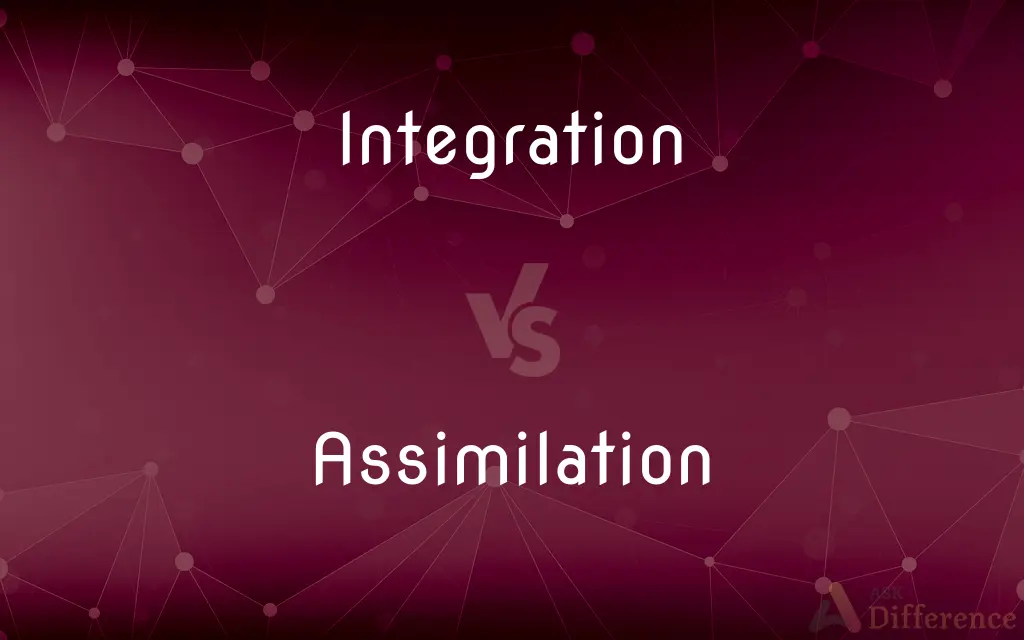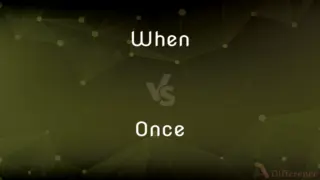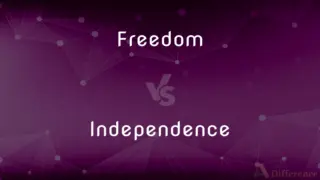Integration vs. Assimilation — What's the Difference?
Edited by Tayyaba Rehman — By Fiza Rafique — Updated on September 28, 2023
Integration is merging diverse groups into a cohesive system. Assimilation is when a minority group adopts the customs of the dominant group.

Difference Between Integration and Assimilation
Table of Contents
ADVERTISEMENT
Key Differences
Integration is a process where diverse groups or individuals come together to form a unified whole, retaining their unique characteristics. In contrast, Assimilation is when one group takes on the cultural, social, and linguistic traits of another, typically dominant, group.
Integration promotes diversity, advocating for equal rights and opportunities for all groups. Assimilation, on the other hand, often implies the disappearance of cultural differences as one group adopts the norms of another.
In societal terms, Integration can mean people of different backgrounds coexisting in a shared space, each maintaining their distinct cultural identities. Assimilation suggests that minority groups will gradually adopt the culture and values of the majority, potentially losing their original identity.
From an educational perspective, Integration might mean students of diverse backgrounds learning together in the same classroom. Assimilation in this context would imply those students all adopting a single dominant culture or way of thinking.
Comparison Chart
Definition
Merging of diverse groups into a cohesive system
Minority group adopts customs of the dominant group
ADVERTISEMENT
Retains Originality
Yes
Often No
Promotes
Diversity and coexistence
Conformity to the dominant culture
Result
Cohesive society with diverse elements
Homogeneous society
Cultural Implication
Maintenance of cultural uniqueness
Loss of original cultural identity
Compare with Definitions
Integration
Unification of different systems or groups.
Economic integration between countries strengthens ties and trade.
Assimilation
Absorption into the predominant culture.
The assimilation process can sometimes lead to loss of unique cultural practices.
Integration
The act or process of integrating.
Assimilation
The process of absorbing one cultural group into another.
The assimilation of immigrants into the mainstream culture was rapid.
Integration
The state of becoming integrated.
Assimilation
The blending or merging of things.
Linguistic assimilation often occurs when two languages interact frequently.
Integration
The bringing of people of different racial or ethnic groups into unrestricted and equal association, as in society or an organization; desegregation.
Assimilation
The integration of new knowledge or information.
His assimilation of the new information was commendably quick.
Integration
(Psychology) The organization of the psychological or social traits and tendencies of a personality into a harmonious whole.
Assimilation
Adopting the traits of a dominant group.
The tribe's assimilation to the colonizers' ways changed their traditions.
Integration
(Mathematics) The process of computing an integral; the inverse of differentiation.
Assimilation
The process of taking in and fully understanding information or ideas
The assimilation of the knowledge of the Greeks
Integration
(Electronics) The process of placing more than one integrated circuit on a single microchip.
Assimilation
The absorption and digestion of food or nutrients by the body or any biological system
Nitrate assimilation usually takes place in leaves
Integration
The act or process of making whole or entire.
Assimilation
The process of becoming similar to something
Watson was ready to work for the assimilation of Scots law to English law where he thought it was justified
Integration
The process of combining with compatible elements in order to incorporate them.
Assimilation
The act or process of assimilating.
Integration
(society) The process of fitting into a community, notably applied to minorities.
Integration into the city
Assimilation
The state of being assimilated.
Integration
(US) racial integration.
Assimilation
(Physiology) The conversion of nutriments into living tissue; constructive metabolism.
Integration
(calculus) The operation of finding the integral of a function.
Assimilation
(Linguistics) The process by which a sound is modified so that it becomes similar or identical to an adjacent or nearby sound. For example, the prefix in- becomes im- in impossible by assimilation to the labial p of possible.
Integration
(biology) In evolution, the process by which the manifold is compacted into the relatively simple and permanent; supposed to alternate with differentiation as an agent in species' development.
Assimilation
The process whereby a minority group gradually adopts the customs and attitudes of the prevailing culture.
Integration
The act or process of making whole or entire.
Assimilation
The act of assimilating or the state of being assimilated.
Integration
The operation of finding the primitive function which has a given function for its differential coefficient. See Integral.
Assimilation
The metabolic conversion of nutrients into tissue.
Integration
In the theory of evolution: The process by which the manifold is compacted into the relatively simple and permanent. It is supposed to alternate with differentiation as an agent in development.
Assimilation
(by extension) The absorption of new ideas into an existing cognitive structure.
Integration
The action of incorporating a racial or religious group into a community
Assimilation
(phonology) A sound change process by which the phonetics of a speech segment becomes more like that of another segment in a word (or at a word boundary), so that a change of phoneme occurs.
Integration
The act of combining into an integral whole;
A consolidation of two corporations
After their consolidation the two bills were passed unanimously
The defendants asked for a consolidation of the actions against them
Assimilation
The adoption, by a minority group, of the customs and attitudes of the dominant culture.
Integration
An operation used in the calculus whereby the integral of a function is determined
Assimilation
The act or process of assimilating or bringing to a resemblance, likeness, or identity; also, the state of being so assimilated; as, the assimilation of one sound to another.
To aspire to an assimilation with God.
The assimilation of gases and vapors.
Integration
The act of combining parts into a whole.
The integration of technology into classrooms has transformed education.
Assimilation
The conversion of nutriment into the fluid or solid substance of the body, by the processes of digestion and absorption, whether in plants or animals.
Not conversing the body, not repairing it by assimilation, but preserving it by ventilation.
Integration
The process of ensuring equal opportunity and participation for all.
Racial integration in schools was a major step toward equality.
Assimilation
The state of being assimilated; people of different backgrounds come to see themselves as part of a larger national family
Integration
Incorporating diverse elements into a cohesive structure.
The team's integration of various skills led to project success.
Assimilation
The social process of absorbing one cultural group into harmony with another
Integration
Merging distinct entities while maintaining their uniqueness.
The city's integration of multiple cultures is its strength.
Assimilation
The process of absorbing nutrients into the body after digestion
Assimilation
A linguistic process by which a sound becomes similar to an adjacent sound
Assimilation
The process of assimilating new ideas into an existing cognitive structure
Assimilation
In the theories of Jean Piaget: the application of a general schema to a particular instance
Common Curiosities
Why might some groups resist assimilation?
They might want to preserve their cultural, linguistic, or social identity.
Is integration the same as assimilation?
No, integration merges groups while retaining uniqueness; assimilation often means adopting dominant group traits.
Does assimilation mean losing one's culture?
It can lead to adopting dominant cultural norms at the expense of original cultural practices.
Can assimilation occur naturally over time?
Yes, especially with prolonged exposure to a dominant culture.
Are modern societies more inclined toward integration or assimilation?
It varies, but many modern societies are moving towards integration to embrace diversity.
Can a society be both integrated and assimilated?
Yes, but integration emphasizes diversity, and assimilation often leans toward homogeneity.
How does integration affect education?
It brings diverse students together, fostering inclusivity and understanding.
Is assimilation a one-way process?
Typically, but dominant cultures can also adopt elements from minority cultures.
Is integration beneficial for societies?
Yes, it can foster understanding and coexistence among diverse groups.
Does integration require governmental policies?
It can be aided by policies promoting equal rights and opportunities.
Does integration mean there's no dominant culture?
No, but it means diverse cultures coexist and are valued.
Share Your Discovery

Previous Comparison
When vs. Once
Next Comparison
Freedom vs. IndependenceAuthor Spotlight
Written by
Fiza RafiqueFiza Rafique is a skilled content writer at AskDifference.com, where she meticulously refines and enhances written pieces. Drawing from her vast editorial expertise, Fiza ensures clarity, accuracy, and precision in every article. Passionate about language, she continually seeks to elevate the quality of content for readers worldwide.
Edited by
Tayyaba RehmanTayyaba Rehman is a distinguished writer, currently serving as a primary contributor to askdifference.com. As a researcher in semantics and etymology, Tayyaba's passion for the complexity of languages and their distinctions has found a perfect home on the platform. Tayyaba delves into the intricacies of language, distinguishing between commonly confused words and phrases, thereby providing clarity for readers worldwide.
















































